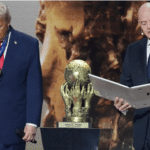As the Social Media U.S. Presidential Election of 2024 approaches, Donald Trump, the 45th President of the United States, remains a pivotal figure in American politics. Despite his erratic and often inflammatory use of social media, Trump’s digital presence is once again taking center stage, particularly as he seeks to return to the White House. Social media platforms, most notably X (formerly Twitter) and Facebook, owned by Elon Musk and Mark Zuckerberg respectively, are preparing for Trump’s resurgence and his ability to dominate political discourse. The revival of Trump’s social media accounts and his strategic use of these platforms raise critical questions about how political communication, public opinion, and voter mobilization will unfold in the digital age.
This article explores how Donald Trump’s return to social media is reshaping political discourse ahead of the 2024 U.S. Presidential Election. It delves into Trump’s history with digital platforms, his use of social media as a tool for mass communication and political mobilization, the role of platform owners like Elon Musk and Mark Zuckerberg, and the broader implications of his social media presence on the U.S. political landscape.
Trump’s Tumultuous History with Social Media
Donald Trump has long been a master of using social media to command public attention, bypass traditional media, and engage with his base of supporters. Throughout his 2016 presidential campaign and his subsequent presidency, Trump leveraged platforms like Twitter, Facebook, and Instagram to communicate directly with millions of followers. His tweets, often characterized by a mix of brash rhetoric, personal attacks, and policy declarations, became a hallmark of his political brand.
However, Trump’s relationship with social media has been anything but smooth. His frequent violations of platform policies, particularly around hate speech, disinformation, and incitement, led to increasing scrutiny. In the wake of the January 6th Capitol riot, Trump was permanently banned from Twitter and Facebook due to his role in inciting the violence. This marked a significant moment in the history of social media governance, as platforms faced unprecedented pressure to balance free speech with the need to curb misinformation and violence.
Following his ban from mainstream platforms, Trump attempted to create his own social media network, Truth Social, as an alternative space for political discourse. While Truth Social found a niche audience, it failed to replicate the massive reach of Twitter and Facebook. For Trump, the need to regain access to these platforms became apparent as he geared up for a potential run in the 2024 election.
The Role of Elon Musk and X (Formerly Twitter)
One of the most consequential developments in Trump’s social media saga occurred when Elon Musk acquired Twitter in 2022. Musk, a vocal advocate for free speech and a critic of content moderation policies on social media, quickly reversed Trump’s ban from the platform. This move sparked widespread debate about the role of social media companies in regulating political speech and the potential consequences of allowing controversial figures like Trump to return to the digital stage.
Musk’s decision to reinstate Trump was framed as a defense of free expression, with the billionaire arguing that social media platforms should not be in the business of censoring political leaders. In Musk’s view, Twitter should function as a “town square” where all voices, regardless of political ideology, have the right to be heard. For Trump, this presented an opportunity to re-engage with the millions of followers he had amassed during his presidency and reignite his digital presence.
Trump’s return to Twitter, now X, has been notable for its unpredictability. His posts range from attacks on political opponents to policy pronouncements, often delivered with the same unfiltered style that characterized his earlier presence on the platform. However, the new version of X, under Musk’s ownership, operates in a different political and technological landscape, one that is more fragmented and polarized than in previous election cycles.
Musk’s influence on the platform has also been scrutinized. Critics argue that his hands-off approach to content moderation could exacerbate the spread of misinformation and political divisiveness. Others contend that his ownership of the platform has shifted the balance of power in political communication, with Musk himself becoming a central figure in shaping the boundaries of acceptable discourse. As Trump continues to use X to amplify his message ahead of the 2024 election, the platform’s role in the political process will remain a focal point of debate.
Mark Zuckerberg, Meta, and the Return to Facebook
While Twitter was Trump’s preferred platform during his presidency, Facebook also played a crucial role in his political strategy. Trump used Facebook to reach a broader and more demographically diverse audience than Twitter, employing sophisticated advertising techniques to target voters with tailored political messages. Facebook’s role in the 2016 and 2020 elections has been the subject of extensive analysis, with critics accusing the platform of failing to adequately address the spread of misinformation and foreign interference.
In 2021, following the Capitol riot, Facebook suspended Trump’s account indefinitely, a decision that was met with both praise and criticism. While many saw it as a necessary step to prevent the spread of harmful content, others viewed it as an overreach that undermined free speech principles.
In 2023, Meta, Facebook’s parent company, announced that Trump’s suspension would be lifted, paving the way for his return to the platform. Mark Zuckerberg, Meta’s CEO, framed the decision as one that was made in consultation with external experts on content moderation and political communication. Zuckerberg emphasized that while Trump would be allowed back on the platform, his posts would be subject to stricter oversight, and any violations of the platform’s policies could result in renewed suspensions.
Trump’s return to Facebook has significant implications for the 2024 election. With over 2.8 billion monthly active users, Facebook remains the largest social media platform in the world, offering Trump a massive audience to communicate with. His campaign has already begun using the platform to target key voter demographics, including older voters and rural communities, through a mix of organic posts and paid advertisements.
Zuckerberg’s handling of Trump’s return will be closely watched, particularly as the platform navigates the challenges of content moderation and political speech in a deeply polarized environment. Meta’s broader initiatives to combat misinformation, including fact-checking partnerships and algorithmic changes, will play a crucial role in shaping the tone and tenor of political discourse on the platform.
Trump’s Strategy: Digital Populism and Political Mobilization
Trump’s use of social media has long been characterized by his embrace of digital populism, a strategy that seeks to mobilize his base through direct, often provocative communication. Unlike traditional politicians who rely on carefully crafted speeches and press conferences, Trump uses social media to bypass the mainstream media and speak directly to his supporters. This approach allows him to maintain an unfiltered connection with his base, which remains a key element of his political strategy.
In the lead-up to the 2024 election, Trump’s social media strategy is likely to focus on a few key elements:
- Rallying the Base: Trump’s core supporters remain deeply loyal, and social media provides him with a platform to galvanize this base. By tapping into issues that resonate with his supporters, such as immigration, trade, and “America First” policies, Trump can energize his followers and drive voter turnout.
- Attacking Opponents: Trump has a long history of using social media to attack political opponents, often through personal insults and inflammatory rhetoric. As the 2024 campaign intensifies, Trump is expected to use platforms like X and Facebook to go after his rivals, including President Joe Biden and other potential Republican contenders. This strategy is designed to dominate news cycles and keep Trump at the center of political discourse.
- Spreading Misinformation: One of the most contentious aspects of Trump’s social media use is his tendency to spread misinformation, particularly regarding election integrity. In the 2020 election, Trump’s false claims about voter fraud led to widespread confusion and ultimately contributed to the events of January 6th. As Trump ramps up his 2024 campaign, there are concerns that he will once again use social media to cast doubt on the legitimacy of the electoral process.
- Fundraising and Campaign Advertising: Social media platforms are not only tools for communication but also essential for fundraising and advertising. Trump’s campaign is expected to use Facebook’s sophisticated advertising tools to target specific voter segments with tailored messages. Additionally, Trump’s ability to raise small-dollar donations through online platforms will be a key factor in funding his campaign efforts.
The Broader Implications for Political Discourse
Trump’s return to social media comes at a time when the U.S. political landscape is more polarized than ever. The rise of misinformation, the decline of trust in traditional institutions, and the increasing influence of social media platforms have all contributed to a fracturing of political discourse. Trump’s ability to dominate the digital space, combined with the platforms’ global reach, raises several important questions about the future of political communication.
1. The Role of Social Media Companies in Democracy
One of the most significant debates surrounding Trump’s return to social media is the role that platforms like X and Facebook play in shaping democratic processes. As private companies, these platforms have the power to amplify or suppress political voices, raising concerns about their influence over elections. The decisions made by Musk, Zuckerberg, and other tech leaders will have far-reaching consequences for how political speech is regulated and whether platforms can effectively balance free expression with the need to prevent harm.
2. The Spread of Misinformation
Trump’s previous use of social media was marked by a frequent disregard for factual accuracy, particularly on issues like the COVID-19 pandemic, election integrity, and immigration. As Trump returns to these platforms, there is a renewed focus on how social media companies will handle the spread of misinformation. Fact-checking initiatives, content warnings, and other moderation tools will be critical in preventing the amplification of false or misleading information that could undermine public trust in the electoral process.
3. Polarization and Echo Chambers
Social media has been criticized for creating echo chambers, where users are exposed only to content that aligns with their existing beliefs. Trump’s presence on platforms like X and Facebook is likely to exacerbate these dynamics, as his posts often appeal to a specific ideological base. The challenge for social media companies will be to create spaces for healthy political debate while avoiding the further entrenchment of political polarization.
4. Impact on Voter Behavior
Finally, Trump’s use of social media will have a significant impact on voter behavior. Social media platforms are powerful tools for voter mobilization, allowing campaigns to target specific demographics with tailored messages. Trump’s ability to reach millions of voters directly through platforms like X and Facebook could prove decisive in key battleground states, particularly if his campaign can effectively harness the power of digital advertising and data analytics.
Conclusion: Trump’s Social Media Presence and the 2024 Election
As the 2024 U.S. Presidential Election approaches, Donald Trump’s return to social media is set to play a central role in shaping political discourse. His unpredictable and often incendiary use of platforms like X and Facebook will continue to dominate headlines and influence voter perceptions. The decisions made by platform owners Elon Musk and Mark Zuckerberg in handling Trump’s presence will be critical in determining how political speech is regulated and how misinformation is addressed.
At a broader level, Trump’s social media redux reflects the evolving nature of political communication in the digital age. As social media platforms become increasingly influential in shaping public opinion and voter behavior, the 2024 election will serve as a critical test of how these platforms navigate the tension between free expression and responsible content moderation. Whether Trump’s digital resurgence will help him reclaim the presidency remains to be seen, but one thing is certain: his use of social media will continue to shape the trajectory of American politics for years to come. ALSO READ:- Japan Seeks Safety for Its Citizens in China After Fatal Stabbing of Japanese Boy 2024





